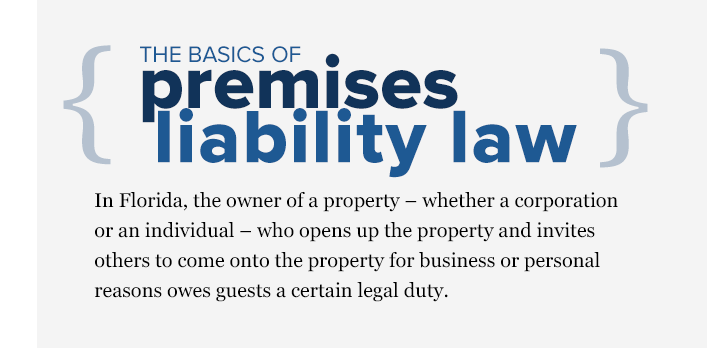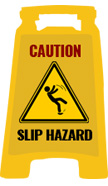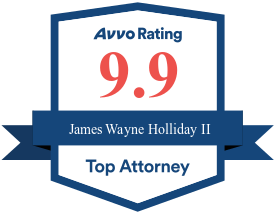Tampa Slip and Fall Cases in Which a Warning Sign Was Posted

For a moment, put yourself in the position of a personal injury attorney. A prospective client comes in on crutches with a cast around his leg and bandages on his head. He tells you the following story: While out at a Tampa-area shopping mall with his children, he slipped and fell on a wet floor. The fall caused significant injuries. The man fractured his leg and hit his head hard on the floor. This caused lacerations that required stitches and a moderate traumatic brain injury.
As you speak with the prospective client further, you discover that he was talking with his children and not necessarily paying attention to where he was walking before the slip and fall. There are some gaps in his memory, but he says that as he was being helped off the floor by paramedics, he saw a small “Wet Floor” sign, yellow in color, approximately 4 feet from where he fell. The sign was situated between a bench and a trash can. He did not see the sign before the slip and fall, but he said he is not sure that he would have seen the sign even if he was looking because sign was in an “out of the way” place.
The client asks whether you will take his case and sue the company that owns the mall for compensation. What do you tell this client?
Basics of Florida Premises Liability Law

Before you answer the prospective client, you quickly review with the client few basics of premises liability law in Florida.In Florida, the owner of a property – whether a corporation or an individual – who opens up the property and invites others to come onto the property for business or personal reasons owes guests a certain legal duty. Specifically, this “duty of care” requires that the property owner conduct regular and reasonable inspections of his or her property and look for any dangerous conditions that might endanger the safety of the guests. If the property owner becomes aware of a dangerous condition, he or she must take reasonable steps to correct the condition and/or warn the guests about the existence of the dangerous condition.
Even if the property owner does not have knowledge of the dangerous condition (i.e., the property owner does not actually see it or hear about it before an injury accident), the property owner may still be found liable for an injury victim’s losses if the condition was such that the property owner should have known about it if the property owner had exercised reasonable care.
In this case, there was a warning sign posted near the wet floor. Does this mean the prospective client is unable to recover any damages?
Determining “Reasonableness” Requires a Complete Investigation
The fact that a warning sign or multiple warning signs were posted near the water or other hazard does not automatically relieve the property owner of liability. Florida law requires that the property owner take
reasonable steps to address the hazard and/or warn others of the hazard. What is reasonable under one set of circumstances may or may not be reasonable under a different set of circumstances. A more thorough investigation needs to be conducted to determine if the posting of the warning signs was a reasonable response to the presence of the hazard.
Factors that a court would consider in determining whether the posting of signs warning guests of a dangerous condition is sufficient to relieve the property owner of responsibility for guests’ injuries include:
 Design and construction of the signs: Were the signs highly visible and designed to attract attention? Was the warning language printed clearly? An orange or yellow hard plastic sign with clearly printed black lettering is preferable to an impromptu sign made by scribbling “Wet Floor” with a pen on a blank piece of paper.
Design and construction of the signs: Were the signs highly visible and designed to attract attention? Was the warning language printed clearly? An orange or yellow hard plastic sign with clearly printed black lettering is preferable to an impromptu sign made by scribbling “Wet Floor” with a pen on a blank piece of paper. Placement of the signs: Were the signs placed in a conspicuous location designed to attract the attention of passersby? Were they placed close to the actual hazard so that those who viewed the sign could see and avoid the hazard? A sign that is placed too far away from the actual hazard – or one that is hidden behind other objects and is not prominently displaced – provides little warning.
Placement of the signs: Were the signs placed in a conspicuous location designed to attract the attention of passersby? Were they placed close to the actual hazard so that those who viewed the sign could see and avoid the hazard? A sign that is placed too far away from the actual hazard – or one that is hidden behind other objects and is not prominently displaced – provides little warning. Nature of the hazard: Was this a hazard that could be cleaned up safely and quickly? If so, posting warning signs around a spill and then failing to promptly clean up the spill may not be considered a reasonable response. However, a large sinkhole that opens up in the middle of a parking lot would require time and resources to correct: in that instance, posting of appropriate warning signs may be a reasonable response.
Nature of the hazard: Was this a hazard that could be cleaned up safely and quickly? If so, posting warning signs around a spill and then failing to promptly clean up the spill may not be considered a reasonable response. However, a large sinkhole that opens up in the middle of a parking lot would require time and resources to correct: in that instance, posting of appropriate warning signs may be a reasonable response.
In the case of the prospective client, it appears he may in fact have a valid premises liability claim. A more thorough investigation into the facts and circumstances surrounding the accident is likely warranted.
What Role Does the Prospective Client’s Own Negligence Play in Premises Liability Cases?
In this prospective client’s case, the mall property’s owner is not the only one who may have acted carelessly. Arguably the prospective client himself acted carelessly by not looking where he was going.
Florida’s comparative fault statute describes what happens in this situation: if the plaintiff (the injured party seeking compensation) is determined to be partially at fault in causing his or her own injuries, this would proportionately reduce the compensation award to which he or she is entitled from the negligent property owner.
It would not, however, mean that the property owner is not liable at all for the injuries caused.

Contact a Tampa Premises Liability Attorney for Assistance Today
If you or a loved one has been injured in a slip and fall case, you do not have to wonder whether you may have a case. Let the experienced
slip and fall lawyers at the Holliday Karatinos Law Firm, PLLC analyze your case and explain your legal rights to you. Our firm is experienced in handling
premises liability cases. We will review the facts of your case so that we can properly advise you of your legal options. Contact the Holliday Karatinos Law Firm, PLLC today by calling our North Tampa or Hernando County office, or
contact us online.

James Wayne Holliday
James Wayne Holliday has been practicing law since 1995. He has been named as a “Best Attorney” Lifetime Charter Member in Florida, an honor awarded to less than one percent of the nation’s lawyers.
Mr. Holliday has earned a reputation as a relentless trial lawyer because of his outstanding work ethic and thorough preparation of his cases for trial.
Author's Bio
 For a moment, put yourself in the position of a personal injury attorney. A prospective client comes in on crutches with a cast around his leg and bandages on his head. He tells you the following story: While out at a Tampa-area shopping mall with his children, he slipped and fell on a wet floor. The fall caused significant injuries. The man fractured his leg and hit his head hard on the floor. This caused lacerations that required stitches and a moderate traumatic brain injury.
As you speak with the prospective client further, you discover that he was talking with his children and not necessarily paying attention to where he was walking before the slip and fall. There are some gaps in his memory, but he says that as he was being helped off the floor by paramedics, he saw a small “Wet Floor” sign, yellow in color, approximately 4 feet from where he fell. The sign was situated between a bench and a trash can. He did not see the sign before the slip and fall, but he said he is not sure that he would have seen the sign even if he was looking because sign was in an “out of the way” place.
The client asks whether you will take his case and sue the company that owns the mall for compensation. What do you tell this client?
For a moment, put yourself in the position of a personal injury attorney. A prospective client comes in on crutches with a cast around his leg and bandages on his head. He tells you the following story: While out at a Tampa-area shopping mall with his children, he slipped and fell on a wet floor. The fall caused significant injuries. The man fractured his leg and hit his head hard on the floor. This caused lacerations that required stitches and a moderate traumatic brain injury.
As you speak with the prospective client further, you discover that he was talking with his children and not necessarily paying attention to where he was walking before the slip and fall. There are some gaps in his memory, but he says that as he was being helped off the floor by paramedics, he saw a small “Wet Floor” sign, yellow in color, approximately 4 feet from where he fell. The sign was situated between a bench and a trash can. He did not see the sign before the slip and fall, but he said he is not sure that he would have seen the sign even if he was looking because sign was in an “out of the way” place.
The client asks whether you will take his case and sue the company that owns the mall for compensation. What do you tell this client?
 Before you answer the prospective client, you quickly review with the client few basics of premises liability law in Florida.In Florida, the owner of a property – whether a corporation or an individual – who opens up the property and invites others to come onto the property for business or personal reasons owes guests a certain legal duty. Specifically, this “duty of care” requires that the property owner conduct regular and reasonable inspections of his or her property and look for any dangerous conditions that might endanger the safety of the guests. If the property owner becomes aware of a dangerous condition, he or she must take reasonable steps to correct the condition and/or warn the guests about the existence of the dangerous condition.
Even if the property owner does not have knowledge of the dangerous condition (i.e., the property owner does not actually see it or hear about it before an injury accident), the property owner may still be found liable for an injury victim’s losses if the condition was such that the property owner should have known about it if the property owner had exercised reasonable care.
In this case, there was a warning sign posted near the wet floor. Does this mean the prospective client is unable to recover any damages?
Before you answer the prospective client, you quickly review with the client few basics of premises liability law in Florida.In Florida, the owner of a property – whether a corporation or an individual – who opens up the property and invites others to come onto the property for business or personal reasons owes guests a certain legal duty. Specifically, this “duty of care” requires that the property owner conduct regular and reasonable inspections of his or her property and look for any dangerous conditions that might endanger the safety of the guests. If the property owner becomes aware of a dangerous condition, he or she must take reasonable steps to correct the condition and/or warn the guests about the existence of the dangerous condition.
Even if the property owner does not have knowledge of the dangerous condition (i.e., the property owner does not actually see it or hear about it before an injury accident), the property owner may still be found liable for an injury victim’s losses if the condition was such that the property owner should have known about it if the property owner had exercised reasonable care.
In this case, there was a warning sign posted near the wet floor. Does this mean the prospective client is unable to recover any damages?
 Design and construction of the signs: Were the signs highly visible and designed to attract attention? Was the warning language printed clearly? An orange or yellow hard plastic sign with clearly printed black lettering is preferable to an impromptu sign made by scribbling “Wet Floor” with a pen on a blank piece of paper.
Design and construction of the signs: Were the signs highly visible and designed to attract attention? Was the warning language printed clearly? An orange or yellow hard plastic sign with clearly printed black lettering is preferable to an impromptu sign made by scribbling “Wet Floor” with a pen on a blank piece of paper. Placement of the signs: Were the signs placed in a conspicuous location designed to attract the attention of passersby? Were they placed close to the actual hazard so that those who viewed the sign could see and avoid the hazard? A sign that is placed too far away from the actual hazard – or one that is hidden behind other objects and is not prominently displaced – provides little warning.
Placement of the signs: Were the signs placed in a conspicuous location designed to attract the attention of passersby? Were they placed close to the actual hazard so that those who viewed the sign could see and avoid the hazard? A sign that is placed too far away from the actual hazard – or one that is hidden behind other objects and is not prominently displaced – provides little warning. Nature of the hazard: Was this a hazard that could be cleaned up safely and quickly? If so, posting warning signs around a spill and then failing to promptly clean up the spill may not be considered a reasonable response. However, a large sinkhole that opens up in the middle of a parking lot would require time and resources to correct: in that instance, posting of appropriate warning signs may be a reasonable response.
Nature of the hazard: Was this a hazard that could be cleaned up safely and quickly? If so, posting warning signs around a spill and then failing to promptly clean up the spill may not be considered a reasonable response. However, a large sinkhole that opens up in the middle of a parking lot would require time and resources to correct: in that instance, posting of appropriate warning signs may be a reasonable response.










